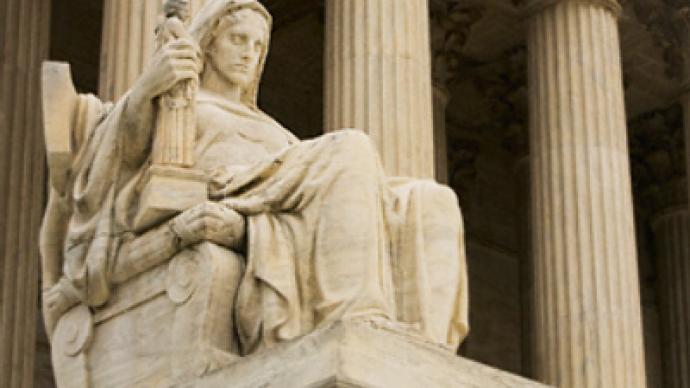Americans get some (supreme) poetic justice

Despite provoking an epic financial crisis of global proportions, corporate power – freshly enriched with taxpayer money – is now cutting deep inroads into the field of politics.
“The means of defense against foreign danger historically have become the instruments of tyranny at home." – American founding father, James Madison, 1789
“The real truth of the matter is that a financial element…has owned the government since the days of Andrew Jackson.” – Franklin Delano Roosevelt, US President, 1933
As the above quotes show, America’s political swing toward something cogently vile and unrecognizable has been lumbering ahead in piecemeal fashion since the nation’s founding. Many of the changes that America has suffered over the years have been subtle, hatched behind closed doors and to the general benefit of corporate power.
Courts Incorporated?
Over time, the US court system has been gradually yet systematically handing over more and more powers to corporate entities at the expense of the people.
In the Dartmouth College Case of 1819, for example, corporations were declared as legal entities, with all of the privileges constitutionally designated to (real) people.
Here is Chief Justice Marshall’s incredible ruling that has dramatically changed the face of the United States: the corporation was legally defined as “an artificial being, invisible, intangible, and existing only in contemplation of law. Being the mere creature of law, it possesses only those properties which the charter of its creation confers upon it, either expressly or as incidental to its very existence… Among the most important are immortality, and if the expression may be allowed, individuality properties by which a perpetual succession of many persons are considered, as the same, and may act as the single individual.”
Imagine that! The first Americans risked a transatlantic journey to escape the oppression of kings and queens, only to wake up one day to discover that corporations were legally ordained as “artificial beings,” “invisible” and “intangible,” while even enjoying a healthy dose of “immortality and individuality.” The only thing that Justice Marshall forgot to give Corporate America was a jeweled crown on its swollen head. This court ruling, no matter how many times it is read, is simply unbelievable. But the Cinderella Story for Corporate America just gets better.
Another whopper of a court ruling that further entrenched corporate power into the fabric of American society was Santa Clara County v. Southern Pacific Railroad Company (1886), which simply took the Dartmouth College Case to the next “logical” level: corporations, now just an Average Joe on the block, would qualify for the same sort of legal protection set down for US citizens under the 14th Amendment of the US Constitution.
Chief Justice Justice William Douglas wrote in 1949, “the Santa Clara case becomes one of the most momentous of all our decisions… Corporations were now armed with constitutional prerogatives.”
(For readers who have little patience for court rulings and proceedings, as this writer does, please be patient, you will be awarded with a nice punch line at the end for your troubles).
Next up, all rise please for First National Bank of Boston v. Bellotti (1978). This case, briefly, gave corporations First Amendment guaranties, which was quickly translated to mean that corporations were able to lobby our government officials on behalf of their interests.
For readers who can handle dry courtroom lingo, here is Justice Rehnquist making an impassioned plea to his peers against the decision, which was entered into force on April 26, 1978:
“It cannot be so readily concluded that the right of political expression is equally necessary to carry out the functions of a corporation organized for commercial purposes. A State grants to a business corporation the blessings of potentially perpetual life and limited liability to enhance its efficiency as an economic entity. It might reasonably be concluded that those properties, so beneficial in the economic sphere, pose special dangers in the political sphere.”
“Furthermore, it might be argued that liberties of political expression are not at all necessary to effectuate the purposes for which States permit commercial corporations to exist. So long as the Judicial Branches of the State and Federal Governments remain open to protect the corporation's interest in its property, it has no need, though it may have the desire, to petition the political branches for similar protection. Indeed, the States might reasonably fear that the corporation would use its economic power to obtain further benefits beyond those already bestowed. I would think that any particular form of organization upon which the State confers special privileges or immunities different from those of natural persons would be subject to like regulation, whether the organization is a labor union, a partnership, a trade association, or a corporation.”
Sadly, Justice Rehnquist was just wasting his breath.
Up to this point, American corporations were enjoying every single privilege granted to the American citizen as established in the Constitution. But “immortality,” “invisibility,” and an army of corporate lobbyists camped out in Congress was not enough for Monsters Incorporated. No, what these cretins craved was total, absolute control not just of the economic opportunities, but the political as well. So in January of this year, the US Supreme Court, by a narrow margin (for better effect, read this listening to Taps, available here ), ruled that the government may not impose a ban on political spending by corporations in candidate elections.
“The 5-to-4 decision was a vindication, the majority said, of the First Amendment’s most basic free speech principle – that the government has no business regulating political speech,” The New York Times reported. “The dissenters said that allowing corporate money to flood the political marketplace would corrupt democracy.”
So the next time you are waiting in the checkout aisle at your neighborhood Monster-Mart, keep in mind that a percentage of every dollar you spend goes directly into Monster-Mart’s political war chest. And given the prodigious clout of Corporate America, not to mention their inherent sliminess, it might need mentioned that they are also hedging their bets, stuffing the campaign chests of both sides of the debate (anybody for a third party, by the way?).
It should be mentioned that the passage of this law infuriated US President Barack Obama to such a degree that he made the unprecedented act of mentioning the court ruling in his State of the Union Address.
“This ruling opens the floodgates for an unlimited amount of special-interest money into our democracy,” Obama said. “This ruling strikes at our democracy itself.”
Corporations had been banned since 1947 from using their consumer-spent dollars to support or oppose political candidates.
"Well I don’t think American elections should be bankrolled by America’s most powerful interests, or worse, by foreign entities. They should be decided by the American people, and that’s why I’m urging Democrats and Republicans to pass a bill that helps to right this wrong," Obama said.
The US president’s unexpected remarks sparked a mini-scandal as Justice Samuel Alito, sitting stern-faced in the audience, was caught mouthing what appeared to be the words “not true” as other members of Congress gave the President a standing ovation.
But the Supreme Court probably doesn’t care much about Obama’s feelings: they are elected to life terms. Yes, life. Till death do us part. For better or for worse.
Corporate Backlash
As a result of the highly provocative rulings on behalf of corporate interests, three political interest groups – MoveOn.org, People for the American Way and Alliance for Justice Action Campaign – launched an ad campaign attacking the Supreme Court for getting too close to Corporate America.
The ad is entitled “The Supreme Court: Corporate America's Newest Subsidiary?” and shows a picture of a judge whose court robe is covered with corporate logos, including Exxon, Aetna, Goldman Sachs and others.
Justin Ruben, Executive Director of MoveOn.org said in a statement that America needs a real debate over court decisions that are radically changing the face of the country.
“Our country must have a real debate over the issues that matter and the future of the Court,” Ruben said. “Not the politics as usual that has become the norm for Supreme Court nomination battles.”
The ad ran this week in the Washington Post after being rejected by the New York Times.
Supreme (Poetic) Justice
For those readers who have made it this far into the article, here is the punch line earlier promised for your efforts. Hope you have not heard it before.
As reported by the BBC, visitors to the US Supreme Court will no longer be able to enter the building by climbing its famous marble steps.
The court cited “security concerns” as the reason entry to the 75-year-old building would be through new doors to the side of the sweeping, iconic central steps.
Two Supreme Court justices objected to the ruling, calling it unfortunate and unjustified.
Stephen Breyer described the main entrance as “not only a means to, but also a metaphor for, access to the court itself.”
Meanwhile, Justice Ruth Bader Ginsburg argued that no other high court in the world – not even Israel's – has ever made the decision to close its front entrance due to security concerns.
The court explained its decision to move the entrance as following the recommendations of two independent security studies, in 2001 and 2009, and was part of a $122m building renovation.
“The (new) entrance provides a secure, reinforced area to screen for weapons, explosives and chemical and biological hazards,” the court statement said.
Americans and other visitors may be happy to know that the main entrance – beneath the words “Equal Justice Under Law” – and expansive steps can still be used by visitors – but only when they leave the building.
Now that is certainly poetic justice, when the highest court in the land must live in fear of its own rulings.
Read also: The world has no money, and the emperor has no clothes













